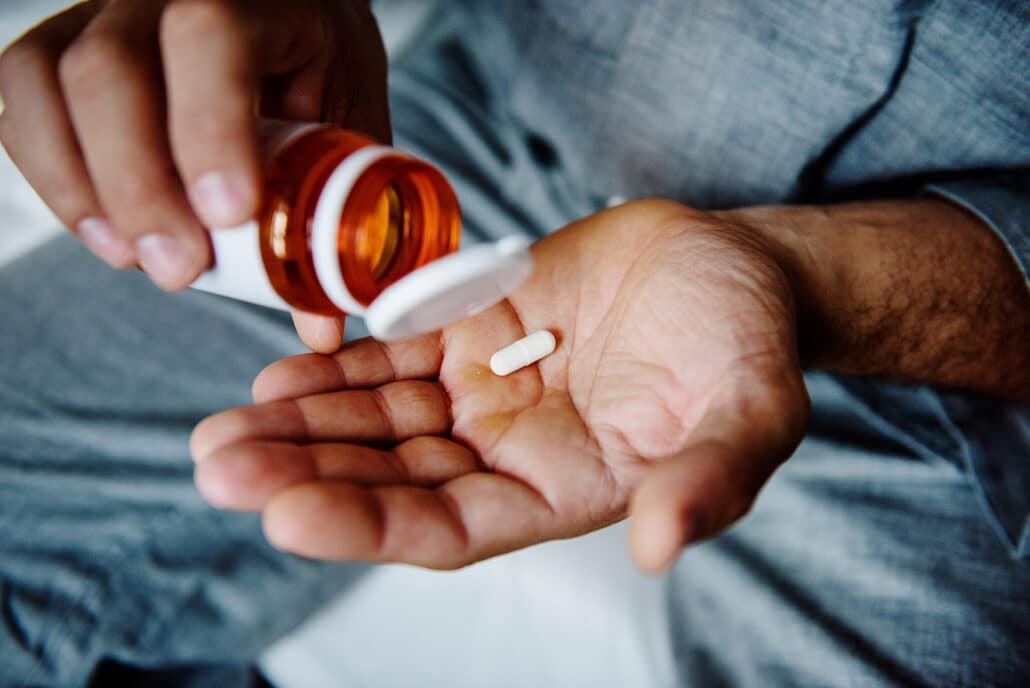Many doctors don’t consider antidepressants addictive. This is because they can’t give users a euphoric feeling or the “high” associated with psychoactive drugs. That said, some consumers still become addicted.

Antidepressant dependence and abuse usually begin with users chasing an effect similar to that of psychostimulants. They attempt to simulate the psychoactive “high” by taking large doses and taking them with other substances like alcohol.
Because antidepressants need time to work, users might also heighten the dosage to produce more immediate effects.
In light of all this, the need for antidepressant addiction treatment programs is important. Data shows that global reliance on antidepressants has steadily increased over the past few years, with its usage spiking after 2019.
There are plenty of antidepressant addiction treatment programs to accommodate individual needs. Specialized programs are tailored to suit the patient’s preferences and circumstances.
Below, we’ve prepared an in-depth guide to antidepression treatment programs to help you pick the most appropriate option for your needs. Read on.
Table of Contents
- 0.1 Definition and Types of Antidepressants
- 0.2 Risk Factors and Causes of Antidepressant Addiction
- 0.3 Effects of Antidepressant Addiction on Physical and Mental Health
- 1 Types of Antidepressant Addiction Treatment Programs
- 2 Components of Effective Antidepressant Addiction Treatment Programs
- 3 How to Choose the Right Antidepressant Addiction Treatment Program
- 4 Overcoming Barriers to Accessing Antidepressant Addiction Treatment
- 5 Preventing Antidepressant Addiction
- 6 Conclusion
Definition and Types of Antidepressants
An antidepressant is a kind of medicine used to cure clinical depression. It exists in different varieties:
Selective Serotonin Reuptake Inhibitors (SSRIs)
SSRIs are the most prescribed antidepressants by doctors. Used to treat moderate to severe depression, they increase serotonin in the patient’s brain.
Serotonin is a neurotransmitter that helps regulate bodily functions such as sleep, mood, and bowel movements.
Serotonin-Norepinephrine Reuptake Inhibitors (SNRIs)
Norepinephrine, or noradrenaline, is a neurotransmitter that’s part of the body’s “fight-or-flight” response or the acute stress response. It increases attention, alertness, and arousal.
SNRIs also increase both serotonin and norepinephrine.
Tricyclic Antidepressants (TCAs)
Tricyclic antidepressants or cyclic depressants increase norepinephrine and serotonin, as well as block another neurotransmitter acetylcholine.
With their balance restored, depression is relieved.
Monoamine Oxidase Inhibitors (MAOIs)
MAOIs were the first antidepressants developed. They prevent the breakdown of dopamine, norepinephrine, and serotonin.

This prevention allows the neurotransmitters to regulate the patient’s mood.
Atypical Antidepressants
These are antidepressants that aren’t considered to be part of the previously mentioned main classes of antidepressants. Several types exist, like bupropion, trazodone, mirtazapine, and vortioxetine.
They’re usually prescribed when other antidepressants haven’t worked on the patient. Just like other antidepressants, they restore the balance of neurotransmitters.
Risk Factors and Causes of Antidepressant Addiction
It’s not in the individual’s will to be dependent on antidepressants. There are a lot of outside factors that eventually lead to dependence and addiction.
Most of these apply to users who have been taking antidepressants for a long time:
- Genetic influences
- Prolonged use which affects tolerance
- Co-occurring mental health disorders
- History of substance abuse
Effects of Antidepressant Addiction on Physical and Mental Health
Antidepressant addiction results in harmful physical consequences, especially withdrawal. Not only that, but it also impacts the patient’s mental health, too.
The physical effects are:
- Electric shock sensations
- Flu-like symptoms
- Insomnia
- Nausea
Meanwhile, the mental health effects include:
- Return of depression
- Anxiety
- Mood disorders
Types of Antidepressant Addiction Treatment Programs
Antidepressant addiction treatment programs are practices designed to help individuals who are suffering from antidepressant abuse.

There are several antidepressant addiction treatments, including:
Inpatient Treatment
This treatment requires the patient to be admitted to a controlled environment. It’s one of the most comprehensive treatment programs.
Description and Benefits
Inpatient treatment can provide 24/7 care and support for patients. They also follow a structured routine which includes counseling, group therapy with fellow patients, and behavioral therapy.
The inpatient facility gives the patient a helpful community and a secure environment for intensive recovery.
Who Is It Best Suited For?
Being admitted to a secure facility is best suited for patients suffering from severe antidepressant addiction. The secure environment is also beneficial for those who reside in an otherwise unsafe environment.
Outpatient Treatment
Unlike inpatient treatment, this program doesn’t require patients to be admitted inside a facility. It provides a more flexible arrangement.
Description and Benefits
In outpatient treatment, patients are allowed to go in and out of the facility during the course of their therapy. This autonomy lets them immediately practice what they learned during therapy sessions in their everyday life.
Who Is It Best Suited For?
The outpatient treatment program is best suited for patients with other responsibilities outside the program, like school, work, or family. Moreover, it’s a less expensive option for those who want to save costs.

Residential Treatment
In contrast with inpatient treatment, the residential treatment program feels less strict and more relaxed. The facilities are also more homey.
Description and Benefits
The residential treatment program is sometimes confused with inpatient treatment. Yet, in residential treatment, patients are allowed to extend their stay in a less structured and more comfy environment.
Who Is It Best Suited For?
This treatment program suits individuals who want to recover in a therapeutic environment with a supportive community of fellow patients.
It’s also a safe place for those who don’t have a conducive environment to recover in, such as stressful homes and workplaces.
Partial Hospitalization Programs (PHP)
This is similar to inpatient treatment. Nevertheless, patients are still allowed to go home at night after a day of intensive therapy.
Description and Benefits
In PHPs, patients typically go to the facility 4-5 days a week, for 4-5 hours a day.
The treatment they get is somewhere in-between inpatient and outpatient treatment. It’s less intensive than the former yet more intensive than the latter.
Who Is It Best Suited For?
A Partial Hospitalization Program is a “step down” from inpatient treatment. It’s appropriate for individuals who just got out of inpatient treatment and are still adjusting to the outside world.
Intensive Outpatient Programs (IOP)
IOPs are just like PHPs, yet patients get an even less intense level of treatment. It’s considered a “step-down” from PHP.
Description and Benefits
In Intensive Outpatient Programs, patients spend 2-3 days with about 2-3 hours per week in the facility. The program includes aftercare planning along with medication guidance. It also focuses on relapse prevention.
Who Is It Best Suited For?
IOP usually comes after patients who just finished PHP. This time, IOP is much more focused on relapse prevention and aftercare. It gives fewer restrictions and more autonomy for individuals trying to transition to everyday life.

Components of Effective Antidepressant Addiction Treatment Programs
An effective antidepressant addiction treatment program has the following components:
Evidence-Based Therapies
These are therapies that are supported by research as well as clinical and experimental data. The different types are:
Cognitive-Behavioral Therapy (CBT)
CBT is a kind of psychotherapy wherein patients are guided to deal with behavior, emotional, and mental patterns. It allows the patient to identify the patterns and then address them.
It’s among the most common therapy methods in addiction treatment programs.
Dialectical Behavior Therapy (DBT)
In DBT, patients are taught skills that help them cope with and handle stressful situations.
Such skills include distress tolerance, emotional regulation, interpersonal effectiveness, and mindfulness.
Motivational Interviewing (MI)
MI is a counseling method that focuses on the role of internal motivation in changing behavior.
Its goal is to guide the patients to overcome the fear of change, doubt, and ambivalence. It also helps the patient commit to the objective of being sober.
Medication Management
Medication management programs aim to treat addicted individuals through careful and effective medication. It involves prescribing and carefully monitoring the individual’s use of the prescribed medicines.
Tapering Off Antidepressants
Patients aren’t recommended to go “cold turkey” on antidepressants. Instead, they gradually taper off the drugs by reducing the dosage in increments.
Typically, the dosage is reduced every 2-6 weeks or more.
Considering Alternative Medications or Treatment Approaches
Alternatives must be supported by credible research. Non-traditional methods include herbal supplements, acupuncture, meditation and yoga, massage therapy, chiropractic care, dietary changes, and mind-body therapies.
Group and Individual Counseling
In group therapy, a counselor leads patients’ sharing of experiences. This provides a supportive and tight-knit group to help in developing coping strategies.
In contrast, individual counseling involves a professional therapist focusing on a patient’s issues intently.
Family Therapy and Support
This therapy method allows the participation of the patient’s family and loved ones.
It acknowledges the essential role of the family in addressing the patient’s behavior and needs. It also aims to reduce the patient’s isolation from loved ones.
Relapse Prevention and Aftercare Planning
After the treatment, patients are provided with a plan to help prevent relapse. The plan aims to identify triggers, such as stress, and then create coping strategies.
Aftercare includes ongoing therapy for newly-sober individuals to manage daily life and regular checkups with a doctor.

How to Choose the Right Antidepressant Addiction Treatment Program
In choosing the right treatment program, remember the following factors:
Assessing Individual Needs and Preferences
Not all patients are the same. Everyone has individual needs that should be accommodated by a suitable treatment program.
Further, cases of addiction vary from type of drug to severity. Only the appropriate program will ensure an effective road to recovery.
Considering Factors Such as Location, Duration, and Cost
The facility should be at a convenient location, such as somewhere close to home, to accommodate the patient’s needs.
Next, the duration of the treatment may affect the patient’s other responsibilities and should not be overlooked.
Lastly, be mindful of the expenses you’d have to spend during the treatment.
Researching and Comparing Different Programs
In researching the various treatment programs, ensure you’re getting your information from a credible source.
Plenty of information can be found online yet only a few can provide you with what you need to know.
You can also seek information from friends, colleagues, or acquaintances.
Seeking Guidance From Healthcare Professionals and Support Groups
There are plenty of available addiction treatment resources if you know how to utilize them.
This includes healthcare professionals and support groups who have the necessary experience to have a well-informed perspective of which treatment programs are the most suitable.

Overcoming Barriers to Accessing Antidepressant Addiction Treatment
Despite various antidepressant treatment programs, many individuals face barriers to accessing the needed treatment.
The following are ways to address the problem:
Addressing Stigma Surrounding Antidepressant Addiction and Treatment
The stigma around addiction and depression affects the patient and may cause feelings of rejection. This may ultimately prevent him from seeking treatment.
Some ways to address stigma are spreading awareness, educating people about stigmatization, and advocating the importance of mental health.
Expanding Insurance Coverage and Affordability of Treatment Programs
To most underprivileged individuals, a treatment program is too expensive.
To address this, the US government has implemented policies like the Affordable Care Act (ACA). It has also sponsored the program Substance Abuse and Mental Health Services Administration (SAMHSA).
Nevertheless, a lot of things can still be done since many individuals remain untreated. For instance, the government could expand Medicaid coverage or enforce parity laws to cover mental health and addiction.
Increasing Awareness of and Access to Specialized Antidepressant Treatment Services
Not everybody has equal access to information. That’s why public awareness campaigns are still important in educating people about antidepressant addiction and the variety of antidepressant treatment services.
The presence of community support groups could also help suffering individuals who may not have other means of accessing treatment.

Preventing Antidepressant Addiction
As the saying goes, “Prevention is better than cure.” Here are ways of curbing antidepressant addiction:
Education and Awareness Campaigns
Addiction can happen because of the lack of awareness of antidepressants’ potential for abuse. So, it’s necessary to launch education and awareness campaigns to inform the general public about the dangers of addiction, as well as to promote the healthy use of antidepressants.
Responsible Prescribing Practices and Patient Monitoring
In prescribing antidepressants, medical practitioners should consider an individual’s medical and mental health history. They should also educate the patient about the dangers of addiction.
On the other hand, patient monitoring involves regular check-ins to identify possible signs of antidepressant dependence.
Alternative Treatment Options for Depression and Mental Health
Many other alternative treatment options are as effective as antidepressants and may even provide more benefits. Some of them are mindful meditation, yoga, acupuncture, exercise, dietary changes, and the use of herbal supplements.
Alternative treatment doesn’t rely on medication which sometimes gives unintended side effects.

Conclusion
Learning about the different antidepressant addiction treatment programs and the extent of their effectiveness can make the difference between short-term and long-term recovery.
Most importantly, always remember that medical professionals are more than willing to lend their hand and knowledge to those struggling with antidepressant addiction.
The medical community remains aware of the urgency of the risks that antidepressant addiction poses. In fact, there’s ongoing research on the way antidepressants work, which may affect their uses and applications in the future.

